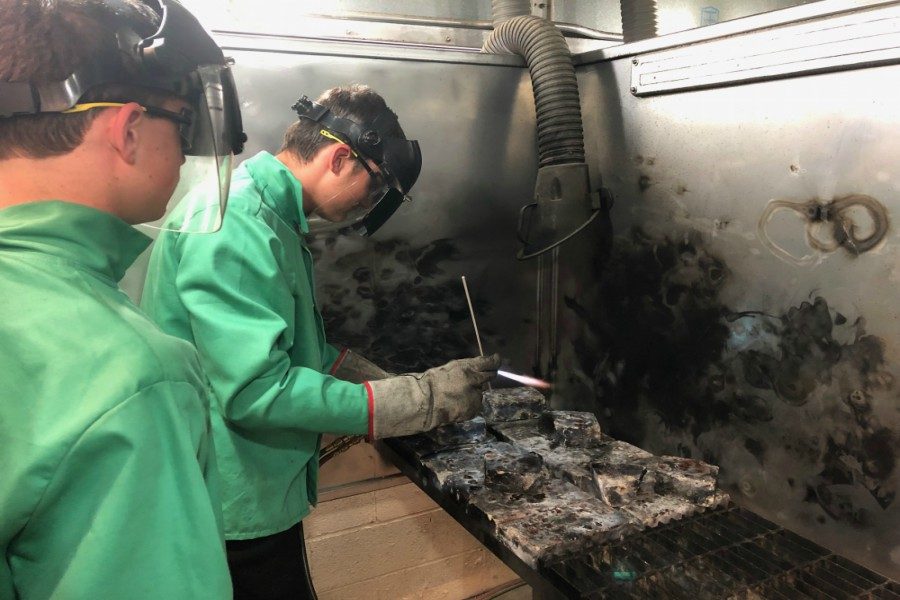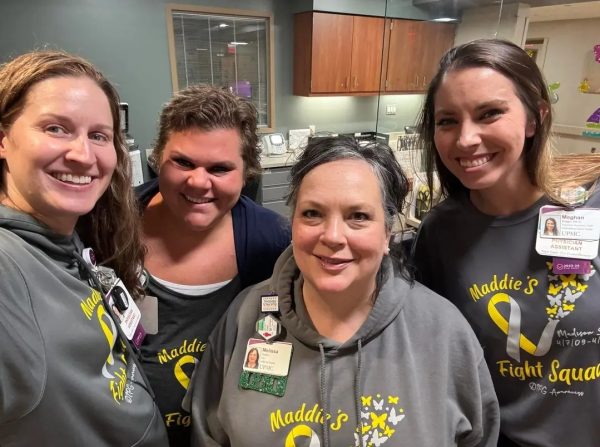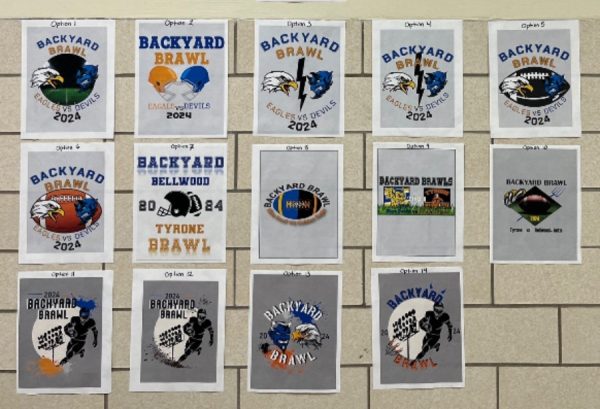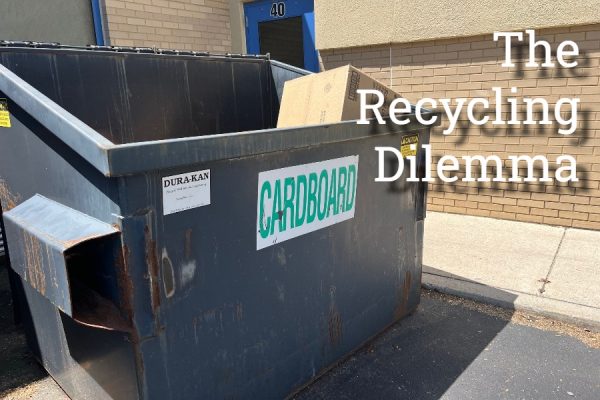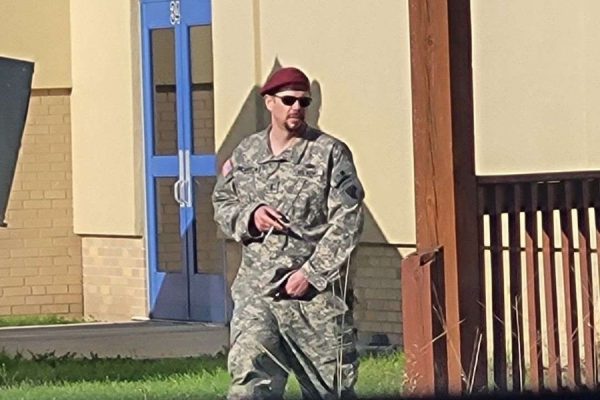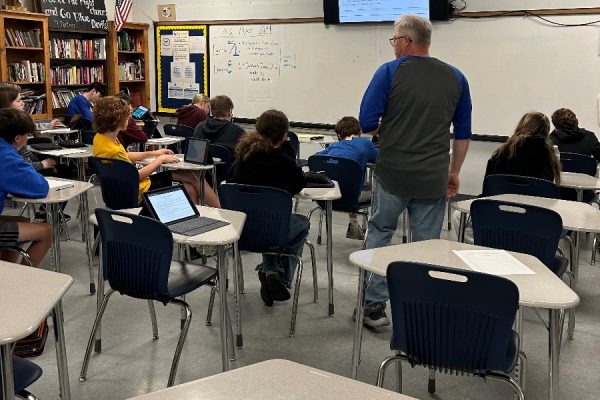LIFETIME SKILLS
Schools attempt to balance fundamentals in education with preparation for life
Life skills are very important, but should they be taught in school?
April 15, 2019
A common complaint among high school students is “When will I ever use this outside of school?”
Others ask, “Why wasn’t I taught this in school?”
High school and college graduates wonder things like this all the time: why don’t I know how to sew a button? Why was I never taught to fix a tire? Why don’t I know these necessary life skills to survive outside of school?
Others insist high school is not necessarily the place for teaching life skills, but high school civics teachers Mr. Matthew McNaul says yes it is.
“I think it is a good idea to have life skills taught at school because these ‘life skills’ aren’t always being taught at home,” said Mr. McNaul. “Young adults should graduate with basic understanding of things such as car mechanics, financial management, etc… in order to function in society. Mr. Gabrielson teaches financial literacy and Mr. Mackereth teaches senior seminar. These should be mandatory for all graduating seniors.”
A battle has waged for centuries over the purpose of education in America. Should public education teach the facts and basic necessities for college or should schools instill students with lessons beyond books to prepare them for life?
COMPETING VISIONS FOR EDUCATION
The 1850s through the 1950s was a time of “progressive education.” John Dewey was one of the leaders for this progress beginning in the early 20th Century. He believed “that schools were not only a place for students to gain content knowledge, but also as a place for them to learn how to live. The purpose of education was thus to realize the student’s full potential and the ability to use those skills for the greater good.”
Dewey experimented with his unique brand of education in laboratory schools.
However the emphasis on creativity was reversed in the 1980s, as public policy emphasized test scores. By 2000, schools were battling to maintain their status under No Child Left Behind.
The goal of high school is to prepare every student for work, college, or whatever drives them after they graduate. Not all students are lucky enough to have good role models at home, not every student will learn to cook, or clean, or change the oil in their car. Some students don’t even know how to sign a their name in proper cursive.
“If you asked me my first year of college if I was prepared after high school I would give a definitive no,” said Jason Bartlebaugh, a Bellwood graduate of 1991.
LIFE SKILLS
Technically, a life skill is a skill that is necessary or desirable for full participation in everyday life. Life skills can be as big as balancing a checkbook and applying for a loan, or as small as signing a name, as every student will have to do in their lifetime.
That means even something as simple as writing in cursive could be considered an important life skill. However, an article from SPU Voices said, “fewer and fewer teachers use cursive themselves, and one survey indicated that only 12 percent of teachers receive any training in cursive instruction. In a different survey, about 16 percent of high school students said that they used cursive when given a choice.”
I think all students should be required to take some type of basic skills class.
— Ms. Harris
Fewer students are learning cursive, and classes in other life skills are often not requirements. Some life skill courses are provided to students if they want them. Industrial arts and home economics are two classes categorized under the arts at B-A.
“Since I teach life skills, I think it is very important to have it in a curriculum,” said Home Economics teacher Ms. Valarie Harris. “I think all students should be required to take some type of basic skills class that teaches them about taxes, insurance, car and house loans, budgeting, cooking, sewing, accounting and expenses. I think everyone should be required to take a financial literacy class.”
These courses teach students how to cook for themselves, learn proper etiquette in the kitchen, how to craft products made from wood and metal, and overall hands-on work you may find yourself needing later in life.
For most teachers at B-A, who came through school during the test-heavy 70s, 80s, 90s, and 2000s, life skills weren’t a part of their high school path.
“We had home ec. and the business classes. I didn’t have to take things like the PSSA, but I don’t remember having classes that offered skills in budgeting,” said Ms. Harris.
When he was growing up, learning life skills was a part of the maturation process, Mr. McNaul said.
“There weren’t really life skills taught when I was in school, but I grew up with parents, who taught me how to change oil, a tire, write a check, make basic house repairs, and run a chainsaw, among other things,” said Mr. McNaul. “Learning life skills helps you become independent. Today, it is so easy to call someone and have them fix easy problems. People could do more for themselves.”
RESPONSIBILITY
There are many teachers at B-A who are proponents of schools teaching life skills.
“I strongly believe it is the school’s responsibility to provide opportunity for the maximum level of student learning. This includes subjects considered both academic and practical,” said Mr. Jim Mackereth, who teaches industrial arts. “But let’s make one thing perfectly clear. I don’t think it is just the school’s or teacher’s responsibility to teach any subject. I strongly believe it is the student’s responsibility to make their maximum effort and learn any subject they take.”
When you become a senior at B-A a new class shows up on your scheduling paper called Senior Seminar. This class is only available to seniors and is taken once a week. It teaches some basic skills like balancing a checkbook.
I don’t think it is just the school’s or teacher’s responsibility to teach any subject. I strongly believe it is the student’s responsibility to make their maximum effort and learn any subject they take.
— Mr. Mackereth
Should a class like this be offered more to younger students to get more experience each year and really learn basic life skills?
“Past administrators in the high school recognized a need for this class and sought out Mrs. Gail Reitz and I to teach this particular course,” said Mr. Mackereth. “That being said, I enjoy teaching this class based upon its practical nature and real-world experiences it provides for students.”
This is the argument among parents, teachers, and students. Things have changed rapidly since parents and teachers have been in the position of students in school today.
“Thirty years ago, all classes would include content in their courses that would give students some real-life experiences, and try to prepare students for employment skills, home improvement repairs and design, or other skills necessary in the ‘real world,'” Mr. Mackereth said. “In recent years, more emphasis has been placed on specific classroom content or on electronic media competencies. Gradually over the years, fewer and fewer students know anything about caring for an automobile, using hand tools for simple repairs around the home, or even comparing prices of goods and groceries at the store. The Senior Seminar class is specifically designed to address these issues that used to be ‘common sense’ to everybody 30 years ago.”
“Five Things High Schoolers Need To Know More Than Computer Science,” has raked in over 32,000 views based on the same idea of life skills in school. The article calls out college board, which is pushing for students to master computer science and the Constitution. The article agrees that these two areas are useful, but there is much more needed before computer science. The article goes on to list its own important school outcomes, including cultural fluency, financial literacy, life skills, grit and character.
Like many areas of school and life, students will get out of it what they put in, Mr.McNaul said.
“I think school does prepare students if the student wants to come to be prepared. There are opportunities for kids to attend CTC to learn a trade, but there is a negative stigma toward trade schools,” Mr. McNaul said. “The result is a student attending college, earning a degree they might not use, and becoming thousands of dollars in debt. Meanwhile, good trade jobs go unfilled. I think society has convinced kids that four year college is the one path to take if you want success. This is far from the truth!”
Think about people who don’t grow up in a family home with good role models that teach life skills and emotional response teachings. Another argument in favor of life skills training goes if students can’t have these life skills taught at home, the school should do something to teach them.
Mr. McNaul has seen a shift in teaching based off standardized testing and the lack of creativity. He said, “I’m not a tested subject so I haven’t been as impacted. I’ve always tried to play a supportive role to the English department when it come to reading and writing. However, those tested subjects have been tailored to meet test requirements, because the school is dependent on certain scores. Unfortunately, it doesn’t allow for the creativity in teaching that use to be.”
“Whether it is preparing students for work after high school or college, the student bears a lot of responsibility for making life after high school a success,” said, Mr. Gabrielson, a long time proponent of teaching life skills at B-A.


